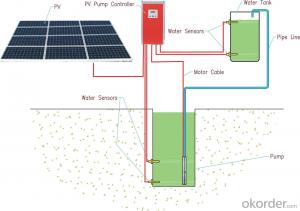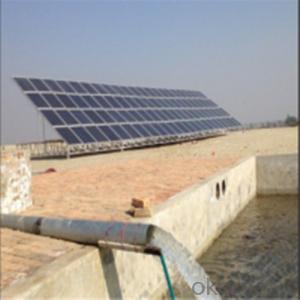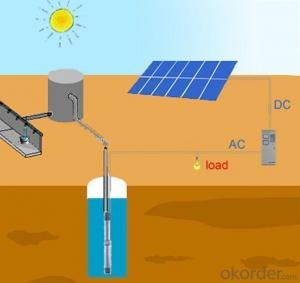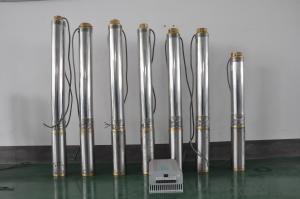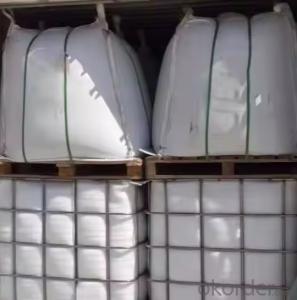Battery Powered Water Pump Solar Panel Water Pumps
- Loading Port:
- Shanghai
- Payment Terms:
- TT OR LC
- Min Order Qty:
- 1 set
- Supply Capability:
- 1000 set/month
OKorder Service Pledge
OKorder Financial Service
You Might Also Like
Battery Powered Water Pump Solar Panel Water Pumps
Advanced Technology
Applications Innovation
The efficiency of DC brushless permanent magnet motor has been increased up to 25% in comparison with traditional asynchronous motor.
Technology Innovation
Stator and rotor are sealed by environment friendly casting resin.Motor insulation resistance can be hold higher than 300MΩfor more than 10 years, which consumedly increased the security and reliability of the submersible motor.
Structure Innovation
Casting resign technology processed stator and rotor as well as the water lubricated bearing make the submersible pump environment friendly.
Feature
High Efficiency & High Reliability
DC Brushless Permanent Magnet Motor
Minimum Maintenance, long Service Life
Environment Friendly Materials, Lubricated Without Oil
Automatic Control
Operate Automatically, No Need Watching
Maximum Power Point Tracking (MPPT)
Dry-run Protection
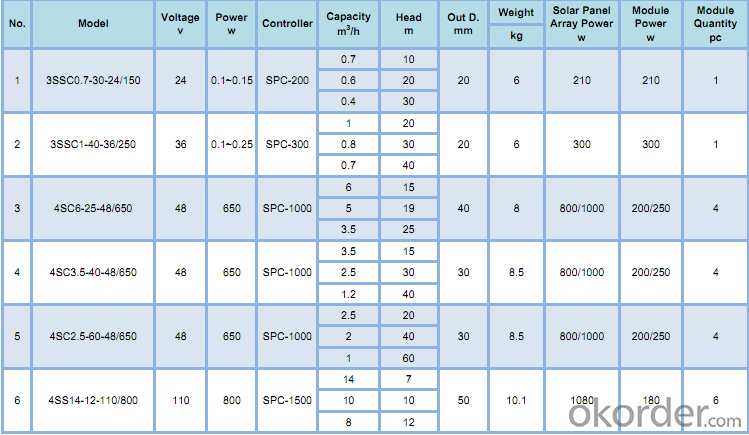
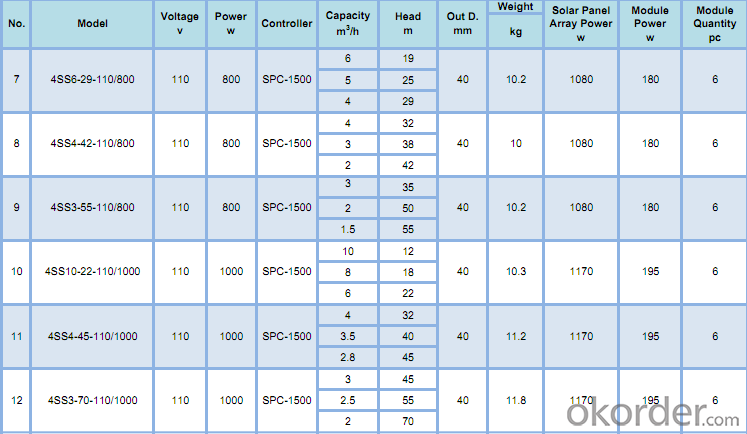
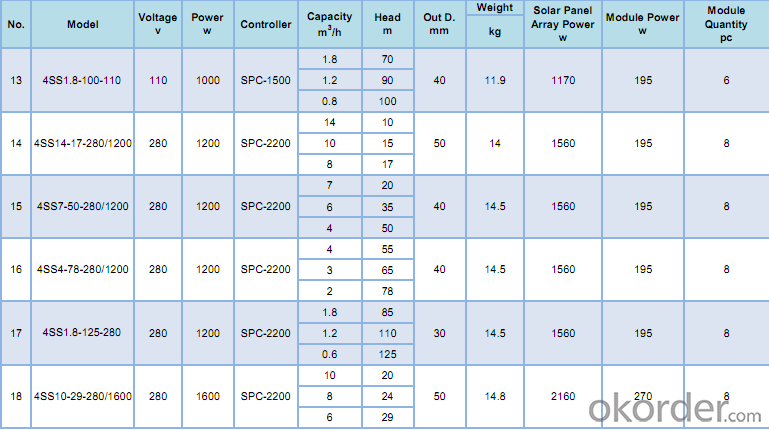
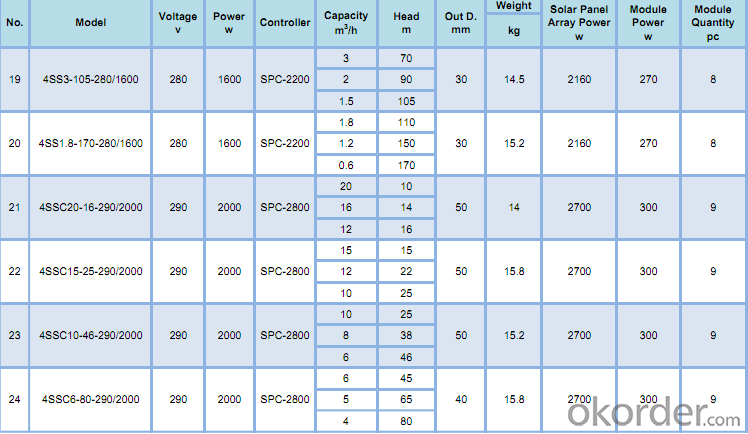
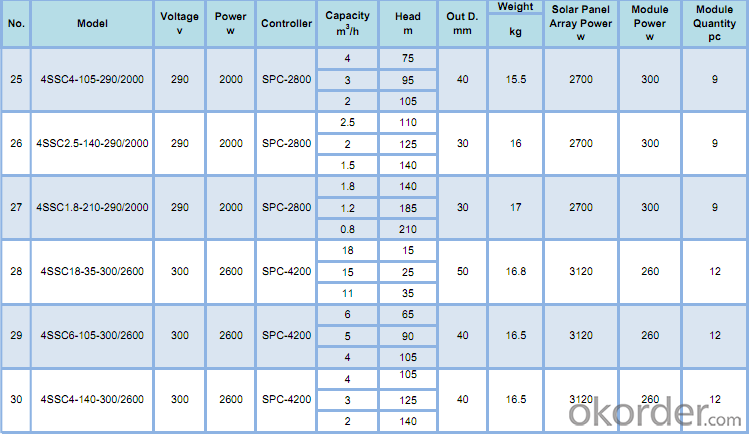
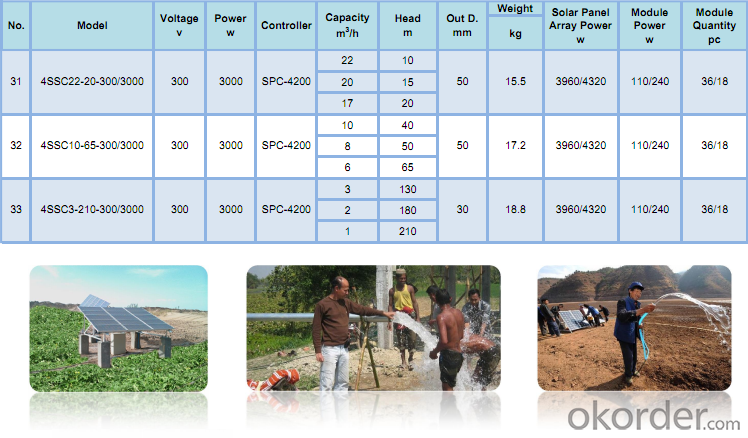
- Q:Can a solar pump be used in areas with high water table levels?
- Indeed, areas with high water table levels can indeed utilize solar pumps. These pumps are specifically designed to extract water from a variety of sources, such as shallow wells, rivers, lakes, and even locations with high water tables. By harnessing solar energy, these pumps operate without the need for electricity or fuel. The depth of the water table has no impact on the functionality of a solar pump, as long as it is installed correctly and the water source remains accessible. In fact, solar pumps are frequently favored in areas with elevated water tables due to their ability to provide a sustainable and cost-efficient means of accessing water, free from dependence on conventional power sources.
- Q:Can solar pumps be used for waterfalls or decorative water features?
- Yes, solar pumps can be used for waterfalls or decorative water features. Solar-powered pumps are a sustainable and environmentally friendly option for creating movement and circulation in water features. They can effectively power small to medium-sized waterfalls or fountains, providing a beautiful and soothing display without the need for traditional electricity sources.
- Q:Are there any limitations to the temperature range a solar pump can operate in?
- Yes, there are limitations to the temperature range a solar pump can operate in. Extreme cold temperatures can cause freezing of the water inside the pump, leading to damage or malfunction. On the other hand, extremely high temperatures can affect the efficiency and performance of the pump's components, such as the solar panels and motor. Thus, solar pumps typically have specified temperature ranges within which they can effectively operate.
- Q:What is the expected lifespan of the motor used in a solar pump system?
- The lifespan of the motor used in a solar pump system can vary depending on different factors. Typically, a well-maintained and high-quality motor can last anywhere from 10 to 20 years. However, it's important to consider that factors like motor quality, frequency of use, operating conditions, and maintenance practices can influence its lifespan. To greatly extend the motor's lifespan, it's essential to have a high-quality motor and properly maintain it through regular servicing. It's crucial to adhere to the manufacturer's maintenance guidelines, which may include regular lubrication, cleaning, and inspection of motor components. Furthermore, protecting the motor from extreme weather conditions, such as excessive heat or moisture, can also contribute to its longevity. Consistently monitoring the motor's performance and promptly addressing any issues can prevent further damage and increase its lifespan. If any signs of malfunction or decreased performance are noticed, it is recommended to consult a professional technician for repairs or replacements. Ultimately, the lifespan of a motor used in a solar pump system can be influenced by various factors. However, by practicing proper maintenance and care, one can ensure optimal performance and longevity for the motor.
- Q:Are solar pumps environmentally friendly?
- Yes, solar pumps are environmentally friendly. They use clean and renewable energy from the sun to power the pumps, eliminating the need for fossil fuels. This reduces greenhouse gas emissions and air pollution. Additionally, solar pumps have minimal environmental impact as they do not require the extraction of natural resources and have lower maintenance and operational costs compared to traditional pumps.
- Q:Can a solar pump be used for water supply in horticulture farms?
- Yes, a solar pump can be used for water supply in horticulture farms. Solar pumps are an environmentally friendly and cost-effective solution for irrigation in farms, as they utilize solar energy to power the pump and provide water for irrigation. This eliminates the need for grid electricity or fuel, thus reducing operational costs and carbon emissions. Additionally, solar pumps can be easily installed and operated in remote areas where grid electricity is not available, making them an ideal choice for water supply in horticulture farms.
- Q:Is it possible to store excess solar energy generated by the pump?
- Yes, it is possible to store excess solar energy generated by the pump. This can be done using various energy storage technologies such as batteries, pumped hydro storage, or thermal energy storage systems. Storing excess solar energy allows for its utilization during times of low solar generation or high energy demand, providing a more reliable and efficient energy supply.
- Q:Can a solar pump be used in off-grid locations?
- Yes, a solar pump can be used in off-grid locations. It relies on solar energy to power its operations, making it a suitable choice for areas without access to electricity. The solar panels collect energy from the sun, which is then converted into electricity to operate the pump. This makes it an environmentally friendly and cost-effective solution for pumping water in remote or off-grid locations.
- Q:Can a solar pump be used for water circulation in a cooling tower or industrial process?
- Certainly, a solar pump has the potential to be utilized for water circulation in a cooling tower or industrial process. The main purpose of solar pumps is to effectively utilize solar energy and convert it into mechanical energy to facilitate water circulation. They find extensive usage in diverse fields such as irrigation, water supply, and cooling systems. When it comes to a cooling tower or industrial process, a solar pump can be employed to ensure the smooth circulation of water within the system. This pump has the capability to draw water from a reservoir or well and subsequently distribute it throughout the cooling tower or industrial process. Consequently, it guarantees a continuous flow of water, essential for cooling or fulfilling other industrial requirements. The utilization of solar pumps in these applications brings about numerous advantages. Primarily, solar pumps are environmentally friendly since they derive their power exclusively from the sun. By diminishing reliance on fossil fuels and minimizing greenhouse gas emissions, they align perfectly with the growing inclination towards sustainable and renewable energy sources. Secondly, solar pumps tend to have minimal operating costs as they do not necessitate electricity from the grid. Once the initial investment in the solar pump system is made, the ongoing operational expenses are considerably low, leading to significant cost savings over time. Moreover, solar pumps are renowned for their reliability and the fact that they require minimal maintenance. These pumps are designed to withstand harsh environmental conditions and can function optimally even in remote areas with limited access to electricity. To summarize, a solar pump is undeniably a suitable choice for water circulation in a cooling tower or industrial process. It offers the advantages of sustainability, cost-effectiveness, and reliability, making it an appealing option for various industrial applications.
- Q:Can a solar pump be used for livestock watering?
- Yes, a solar pump can be used for livestock watering. Solar pumps are a sustainable and cost-effective solution for providing water to livestock in remote areas where electricity may not be readily available. These pumps harness energy from the sun to power their operation, making them an environmentally friendly option. They can be used to pump water from wells, boreholes, or other water sources to provide a reliable supply for livestock watering.
1. Manufacturer Overview |
|
|---|---|
| Location | |
| Year Established | |
| Annual Output Value | |
| Main Markets | |
| Company Certifications | |
2. Manufacturer Certificates |
|
|---|---|
| a) Certification Name | |
| Range | |
| Reference | |
| Validity Period | |
3. Manufacturer Capability |
|
|---|---|
| a)Trade Capacity | |
| Nearest Port | |
| Export Percentage | |
| No.of Employees in Trade Department | |
| Language Spoken: | |
| b)Factory Information | |
| Factory Size: | |
| No. of Production Lines | |
| Contract Manufacturing | |
| Product Price Range | |
Send your message to us
Battery Powered Water Pump Solar Panel Water Pumps
- Loading Port:
- Shanghai
- Payment Terms:
- TT OR LC
- Min Order Qty:
- 1 set
- Supply Capability:
- 1000 set/month
OKorder Service Pledge
OKorder Financial Service
Similar products
New products
Hot products
Hot Searches
Related keywords
